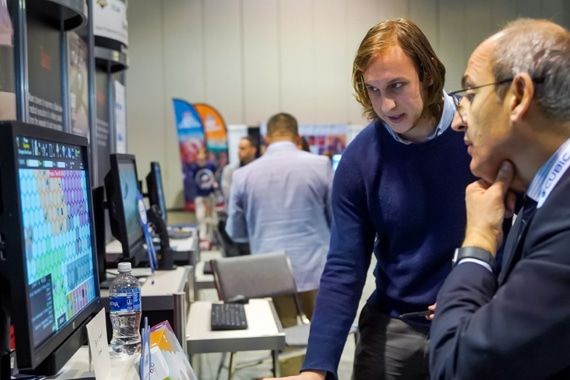The Bulletin announces its 2020 Leonard M. Rieser Award
By Bulletin Staff | December 15, 2020

“Quantum computing will have an impact on national security, just not in the way that some of the policy community claims that it will.”
The Bulletin of the Atomic Scientists has named Jake Tibbetts as its 2020 Leonard M. Rieser Award recipient for his February 11 essay “Keeping classified information secret in a world of quantum computing.” The article was selected by the Bulletin’s editorial team from its “Voices of Tomorrow” column–a column that promotes rising experts who write with distinction on topics including nuclear risk, climate change, and disruptive technologies.
Tibbetts is a master’s student at University of California, Berkeley, where he is studying electrical engineering and computer science and researching the application of machine learning to nuclear safeguards. He is a fellow at the Nuclear Science and Security Consortium and a former research associate at the Center for Global Security Research at Lawrence Livermore National Laboratories.
Tibbetts was also involved in the creation of “SIGNAL,” an online three-player experimental wargame in which three countries, some armed with nuclear weapons, attempt to achieve national goals through diplomacy and conflict. SIGNAL is designed to increase understanding of the impact of emerging technologies on strategic stability and nuclear risk reduction. Tibbetts is interested in cybersecurity and national security from both a technical and a policy perspective.
“In his piece, Jake Tibbetts accomplished the kind of deep, thoughtful, and well-crafted journalism that is the Bulletin’s hallmark,” editor-in-chief John Mecklin said. “Quantum computing is a complex field; many articles about it are full of strange exaggerations and tangled prose. Tibbetts’ piece, on the other hand, is an exemplar of clarity and precision and genuinely worthy of the Rieser Award.”
The Rieser Award is the capstone of the Bulletin’s Next Generation Program, created to ensure that new voices, steeped in science and public policy, have a trusted platform from which to address existential challenges. It is named for physicist Leonard M. Rieser (1922-1998), board chair at the Bulletin from 1984 to 1998.
“The Leonard Rieser Award is designed to inspire thought-provoking scientific essays that can contribute to advances in public policy,” said Tim Rieser who, along with his brother Len and sister Abby, helped establish the Rieser Award in their father’s honor. “Jake Tibbetts, this year’s awardee, has done us all a service by tackling quantum computing and the so-called ‘race for quantum supremacy.’ The hype surrounding that ‘race,’ he argues, may be obscuring a more serious issue – the need to protect existing encrypted information against future decryption techniques. As someone who has had access to encrypted information, I congratulate Mr. Tibbetts and the Bulletin for highlighting a subject that has serious implications for us all and deserves greater attention.”
The Rieser Award includes a $1,000 cash prize and a one-year subscription to the Bulletin’s online magazine. The Rieser Award recipient is also invited to offer remarks at the Bulletin’s annual dinner in November. More about the award, Leonard M. Rieser, previous recipients, and all Voices of Tomorrow authors, can be found here.
To support to the Bulletin’s Next Generation programs–visit our gift page.
Together, we make the world safer.
The Bulletin elevates expert voices above the noise. But as an independent nonprofit organization, our operations depend on the support of readers like you. Help us continue to deliver quality journalism that holds leaders accountable. Your support of our work at any level is important. In return, we promise our coverage will be understandable, influential, vigilant, solution-oriented, and fair-minded. Together we can make a difference.














